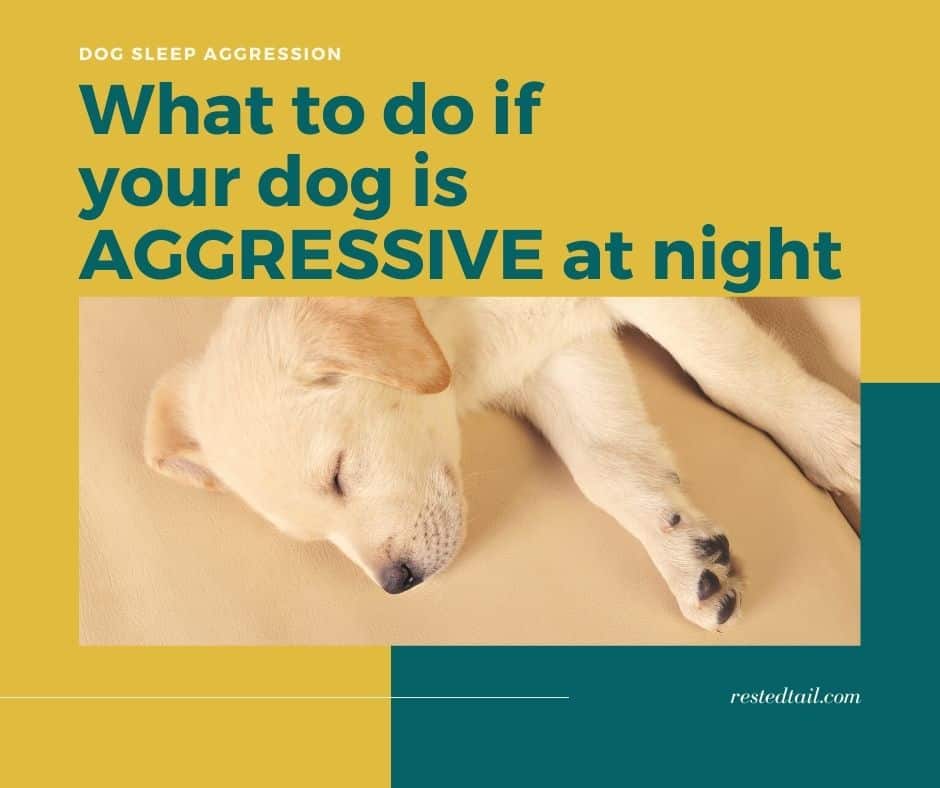Dog sleep aggression is a common problem for many dog parents. Often, owners will find themselves trying to deal with an aggressive barking or growling dog when they put their pet to bed. This can be frustrating and hard on the owner, leading them to give up on training altogether.
If your dog is waking you up in the middle of the night for no apparent reason, he might have a problem with sleep aggression.
Dogs that are not getting enough sleep can quickly become aggressive when they finally do get to bed. You should address this type of behavior as soon as possible.
In this blog post, we’ll discuss why dogs get aggressive when sleeping and how you can help your dog with sleep aggression. We’ll also cover what to do if your dog is aggressive at night so that you can start getting a good nights’ rest again!
What is dog sleep aggression and what causes it?
Dog sleep aggression is when a dog becomes aggressive or irritable while sleeping. It’s typically common in large breeds, such as the Doberman Pinscher or Great Dane.
There are many different potential causes for this behavior, but one of the most likely ones relates to dominance and territorialism.
Dogs may feel that you’re invading their territory by going near them while they sleep, which may lead to adverse reactions during the day too!
Some people mistakenly think it has something to do with safety concerns- “If I’m not there, who will protect my dog?” But dogs don’t need protection from their human family members!
Even healthy and stable dogs can have stress in the form of sleep aggression from many different factors.
A variety of things can cause a dog’s aggression at night: unfamiliar surroundings, change of environment, physical ailments, addition or loss of family members, or the loss of another companion animal.
How to deal with a dog that has sleep aggression?
One way to help with the dog’s aggression is to teach them that it’s okay for you (or a family member) to be close by and sleep near them.
This can involve training where you reward them with treats when they seem accepting of their human being nearby at night.
Another technique would be “No Touch Overnight Dens.”
A designated area in your home where your dog will spend time during different parts of the day/night but won’t interact with humans until morning.
An example of that would be a crate or a separate room.
You may also want to try medication; many people have seen success reducing anxiety medications, such as Clomipramine and Fluoxetine.
These are drugs to treat symptoms of depression and anxiety.
You can check out The Complete Guide on Clomipramine on Amazon or get the supplements chews.
Tips for preventing your dog from becoming aggressive during the night.
-Provide a designated area for nighttime sleeping. Put a dog bed or crate in your bedroom and use it instead of the bed during evening hours.
-Take walks around the house before you go to sleep so that they’ll feel tired when they’re ready for bed!
-If they do happen to wake up, try not to interact with them until morning; this will help prevent them from feeling anxious about being awake at night.
-Provide an “Overnight Den” where they are allowed access, but no interaction with humans should occur! After all, we’re asleep while our pets are wide awake and active!
-If these habits have been occurring consistently for a long time, you may feel like your dog is a lost cause. Fortunately, some professionals can assist in the form of training and obedience courses!
-On the other hand, If these habits have occurred sporadically or infrequently but still make you nervous about what might happen when they do occur, place an “Overnight Den” in a different room (preferably close to where the pet sleeps) with food/water bowls inside.
The chances of him/her waking up anxious will decrease due to lack of water during the night and allow for more restful sleep for your pet.
Why does my dog growl when he sleeps?
When dogs bark at nothing during their sleep cycle (or moan), sometimes it means they’re just having a dream about chasing squirrels around the backyard.
Dogs do that because they can’t control their actions while sleeping and often react to stimuli that would be subconscious if awake.
Some medical conditions can also cause your pet discomfort, which may result in a response like this when asleep. Tooth pain from an abscessed molar inside of his mouth, for example.
Other reasons are completely harmless, so there isn’t any way for you to determine what reaction he’ll give without seeking professional help first!
The whimpering and growling can also be an indication of anxiety or fearfulness in response to something happening in the environment.
– Be sure to keep an eye on him and see if his symptoms improve with changes made, like moving from one room to another.
– If you notice any other behaviors such as excessive drooling, seizures, vomiting, diarrhea, or constipation, then consult a veterinarian immediately for further evaluation and treatment options.
How can I help my dog with sleep aggression?
At night, dog sleep aggression can be a problem. When you begin to think about it, it’s not too unreasonable when we consider that there are sounds and smells at night which the dog doesn’t experience during the daytime.
So what should you do? Here are some tips on how to help your dog with their sleep aggression:
The first thing is the most obvious – turn off any lights in the room where they’re sleeping. You can even cover up light-emitting sources like cell phones and monitors if possible.
Some dogs are more likely to be aggressive when sleeping if they are bothered by noises. It is best to try to block out sounds with earplugs or a white noise machine and use blankets, sheets, or other fabrics to cover their eyes and skin.
The best rule of thumb is to not ever surprise them by waking your dog from a deep sleep with a touch.
Instead, the best way to deal with it is to call your dog’s name or clap your hands first to wake him.
One way to desensitize a dog at night is by petting him gently when he’s in a calm resting state, but not yet sleeping.
This will help the dog become accustomed to the feeling and reduce his aggression.
Working on leadership exercises and providing daily walks should also be part of your plan to help with sleep aggression in a dog.
I would suggest solid but loving and gentle leadership and consistency for both on a daily basis.
How to deal with dog aggression at night?
Some dogs may have night-time anxiety or separation anxiety. This is often due to a fear of the dark, an unfamiliar environment, or outside noise.
Separation anxiety typically occurs when your dog isn’t used to being left alone for long periods of time during the day.
The solution is not always easy but there are many things you can do if this applies to your dog:
- Be aware of where his food bowl is placed in relation to his sleeping spot. (either in the kitchen or living room).
- Teach your dog to be more comfortable with being left alone at night by having him spend more time awake and interacting with family members and other dogs during the day.
- Offer comfort by giving a favorite toy, blanket, pillow, or treat just before departure and upon return so that he’s rewarded for being in his kennel.
- Play some white noise such as music or a fan to help him feel more comfortable and relaxed.
- Try leaving the TV on when you’re gone so he’ll be distracted by its sounds while feeling less anxious about not seeing your presence.
- Consider using calming sprays that can mask dog-related odors, which may trigger separation anxiety pangs (available at most pet stores).
- Figure out if your dog likes to sleep with the light on or in the dark.
The best option is to have someone stay with your dog during this transition period but if it’s just a temporary fix, then try out one of these options until you find what works best for both you and your pup!
Ways to keep your pup calm when they’re trying to go back to bed after waking up.
- Allow your pup to go back to bed on its own.
- Hide a treat under the covers and let them find it.
- Give your pup something they can chew on, like a rawhide or a toy.
- Keep the bedroom dark and quiet so that they’ll feel more comfortable.
- You can stay beside your dog for a bit, to provide reassurance of safety.
- If you crate train your dog, make sure not to take them out of the crate when they awake.
Should I pet my dog while sleeping?
Almost everyone knows the instinctive feeling of wanting to pet their dog when they are sleeping.
However, if your dog is aggressive at night and you’ve noticed that he or she gets more agitated when touched while resting, don’t do it!
You need to understand why this happens before touching them.
It could be because they need something (like food) or want some space.
Sometimes when dogs have night terrors, it’s best to leave them alone.
What you’re doing looks like an attack on your dog in her mind.
When she wakes from her ‘nightmare’, you can start petting her again only when she has calmed down.
Should I wake my dog if he’s having a nightmare?
“Let sleeping dogs lie” is the saying. If your dog is having a dream, make sure to allow him to wake from it himself.
You can try waking him gently and speaking in soothing tones if you think that will help calm his anxiety or fear of sleep again.”
It’s best not to interfere with them when they’re sleeping.
When a dog dreams, they can sometimes react in an aggressive way towards someone waking them.
This can be dangerous if it happens while another person is nearby as a child.
So the best thing you can do for your dog when this occurs is to wait for your dog to wake up and then comfort him after.
In Conclusion
Sometimes the sweetest creatures can be more aggressive than you’d think.
Sleeping dogs may growl when they are disturbed, but based on their behavior otherwise, that does not signify aggressive behavior.
These dogs can also be well-adjusted and friendly with humans in all other aspects because their sleep habits are so adorable!
With patience, consistency, and proper training methods such as clicker training, you can train most dogs successfully out of their aggressive tendencies at any age.
If you’re worried about your dog’s behavior, don’t hesitate to contact a veterinarian and get some help. All pets need to have adequate sleep time to be their best selves during the day while also being healthy!
Hopefully, these tips about dog sleep aggression will help make night-time easier and prevent future issues. Good luck!
Recent Posts
As a dog owner, you want to ensure that you take proper care of your furry companion. A common question that many pet owners have is, "Can I walk my dog 30 minutes after eating?" Understanding the...
Have you ever considered getting an elevated dog bed for your furry friend, but wondered if it's worth the investment? If so, you're not alone. As dog owners, we all want to provide the best care for...

